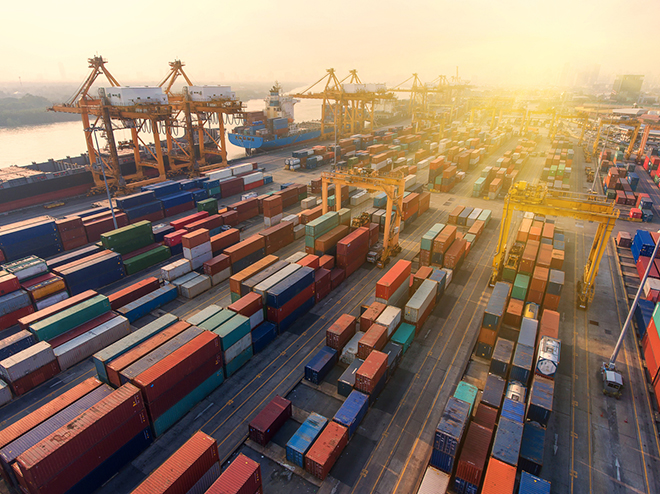Featured Topics
Featured Products
Events
S&P Global Offerings
Featured Topics
Featured Products
Events
S&P Global Offerings
Featured Topics
Featured Products
Events
S&P Global Offerings
Featured Topics
Featured Products
Events
Financial and Market intelligence
Fundamental & Alternative Datasets
Government & Defense
Banking & Capital Markets
Economy & Finance
Energy Transition & Sustainability
Technology & Innovation
Podcasts & Newsletters
Financial and Market intelligence
Fundamental & Alternative Datasets
Government & Defense
Banking & Capital Markets
Economy & Finance
Energy Transition & Sustainability
Technology & Innovation
Podcasts & Newsletters
29 Apr, 2021

By Ben Dyson
The sudden failure of supply chain finance provider Greensill Capital may lead to trade credit insurance underwriters treading more carefully in some areas, but specialists say the market should be resilient to the fallout.
Greensill's main trading entity, London-based Greensill Capital (UK) Ltd., called in the administrators on March 8, saying it could no longer pay its debts. Signs of trouble emerged a week earlier when Credit Suisse Group AG division Credit Suisse Asset Management (Switzerland) Ltd. froze $10 billion of supply chain finance funds, reportedly because of Greensill's failure to renew its trade credit insurance cover, which protects against nonpayment.
The events have prompted concerns of knock-on effects for the wider supply chain finance and trade credit insurance markets.
 The International Credit Insurance and Surety Association has said 95% of respondents to an annual survey expected an increase in global demand for credit insurance in 2021. |
Flight to quality
In traditional trade credit insurance arrangements, an insurer covers a seller of goods or services against nonpayment by the buyer. Supply chain financing introduces a third party in the transaction, typically a bank, that pays the seller and later collects payment from the buyer. This provides the seller with quicker payment and the buyer longer to pay than a direct transaction. In this arrangement, the trade credit insurer covers the supply chain finance provider, rather than the original seller, for nonpayment by the buyer.
Scott Ettien, global trade credit head at broker Willis Towers Watson PLC, said in an interview that the Greensill fiasco would prompt insurers to review how they are underwriting all supply chain finance deals and encourage them to favor banks over alternative providers, such as asset managers, because the banks have a reputation for more rigorous deal structures.
"They are going to want to see asset managers look and smell more like a bank in order to pass their guidelines," Ettien said.
Getting capacity for any deals, with banks or with alternative providers, that stray from the fundamentals could become more difficult, he added.
According to Ettien, asset managers' primary customers are single buyers with credit ratings that are low investment grade or below investment grade. The Greensill news could trigger a "flight to quality" by underwriters, particularly for asset managers known to "play in a space that is mostly non-investment grade."
The trade credit insurance market had already been examining the risks they underwrite more carefully since the beginning of the COVID-19 pandemic and had increased prices, according to Richard Wulff, executive director-in-waiting at the International Credit Insurance and Surety Association. The Greensill saga has not accelerated that trend, he added.
Rising prices for trade credit cover stand to boost premium volumes across the industry. S&P Global Ratings in an April 21 assessment said while premium volumes had fallen 10% to an expected €6.2 billion in 2020, according to ICISA figures, there was "potential upside" arising from hardening conditions in the industry.
Demand for cover
Even if insurers grow more cautious, the market should be largely unscathed by the Greensill fallout, according to trade credit insurance specialists. Vinco David, secretary general at export credit and investment insurance association the Berne Union, said the incident "looks like a one-off" and the supply chain financing business is sound and insurers are happy to cover it.
"This will be seen for what it is — an isolated incident," Wulff agreed.
David also noted that there was "no systemic risk" associated with Greensill, though some small to medium-sized suppliers have lost their financing.
Instead of deterring companies from using supply chain finance, and in turn shrinking demand for the associated insurance cover, Greensill's demise could have the reverse effect, said Ettien. Because economic downturns expose liquidity problems, a boom in supply chain financing followed the last global financial crisis.
"I don't think it is going to be any different" this time, Ettien said.
Wulff said his association's members had a "bumper" first quarter for new business. "I don't think the top lines of the trade credit insurers will suffer because of this, or will suffer at all," he said.
ICISA said March 3 that 95% of the trade credit insurance respondents in an annual survey expected an increase in global demand for credit insurance in 2021 "due to greater risk awareness and increased likelihood of defaults."